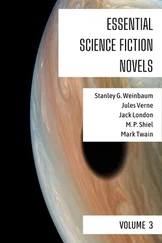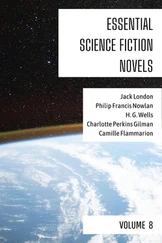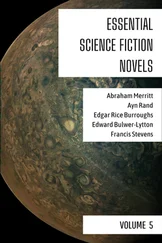I observed to the Brahmin, that it was a singular, and somewhat inexplicable, species of madness.
"True," he replied; "this man's conduct cannot be explained upon any rational principles—but he is one of the Glonglims, of which I have spoken to you; and examples are not wanting on our planet, of conduct as irreconcilable to reason. This man is making an article which is scarce, as well as useful, in this country, where gravity is less than it is with us: the force of the wind is very great, and the metal is possessed but by a few. Now, if you suppose these nails to be pieces of gold and silver, his conduct will be precisely that of some of our misers, who waste their days and nights in hoarding up wealth which they never use, nor mean to use; but, denying themselves every comfort of life, anxiously and unceasingly toil for those who are to come after them, though they are so far from feeling, towards these successors, any peculiar affection, that they often regard them with jealousy and hatred."
While we thus conversed, there stepped up to us a handsome man, foppishly dressed in blue trowsers, a pink vest, and a red and white turban; who, after having shaken my companion by the ears, according to the custom of the country among intimate friends, expressed his delight at seeing him again in Morosofia. He then went on, in a lively, humorous strain, to ridicule the nail-smith, and told us several stories of his singular attachment to his nails. In the midst of these sallies, however, a harsh looking personage in brown came up, upon which the countenance of our lively acquaintance suddenly changed, and they walked off together.
"I apprehend," said the Brahmin, "that my gay acquaintance yonder continues as he formerly was. The man in brown, who so unseasonably interrupted his pleasantry, is an officer of justice, and has probably taken him before a magistrate, to answer some one of his numerous creditors. You must know," added he, "that the people of the moon, however irrational themselves, are very prompt in perceiving the absurdities of others: and this lively wit, who, as you see, wants neither parts nor address, acts as strangely as the wretch he has been ridiculing. He inherited a large estate, which brought him in a princely revenue; and yet his desires and expenses so far outgo his means, that he is always in want. Both he and the nailmaker suffer the evils of poverty— of poverty created by themselves—which, moreover, they can terminate when they please; but they must reach the same point by directly opposite roads. The blacksmith will allow himself nothing—the beau will deny himself nothing: the one is a slave to pleasure—the other, the victim of fear. I told you that there were but few whose estates produced the metal of which these nails are made; and this thoughtless youth happens to be one. A few years since, he wanted some of the blacksmith's nails to purchase the first rose of the season, and pledged his mines to pay, at the end of the year, three times the amount he received in exchange; and although, if he were to use but half his income for a single year, the other half would discharge his debts. I apprehend, from what I have heard, that he has, from that time to this, continued to pay the same exorbitant interest. When I was here before, I prevailed on him to take a ride with me into the country, and, under one pretext or another, detained him ten days at a friend's house, where he had no inducement to expense. When he returned, he found his debts paid off; but knowing he was master of so ready and effectual an expedient, he, the next day, borrowed double the sum at the old rate. Since that time his debts have accumulated so rapidly, that he will probably now be compelled to surrender his whole estate."
"Is he also a Glonglim?" I asked.
"Assuredly: what man, in his entire senses, could act so irrationally?"
"There is nothing on earth that exceeds this," said I.
"No," said the Brahmin; "human folly is every where the same."
Physical peculiarities of the Moon-Celestial phenomena—Further description of the Lunarians—National prejudice—Lightness of bodies—The Brahmin carries Atterley to sup with a philosopher—His character and opinions.
After we had been in the moon about forty eight hours, the sun had sunk below the horizon, and the long twilight of the Lunarians had begun. I will here take occasion to notice the physical peculiarities of this country, which, though very familiar to those who are versed in astronomy, may not be unacceptable to the less scientific portion of my readers.
The sun is above the horizon nearly a fortnight, and below it as long; of course the day here is equal to about twenty-seven of ours. The earth answers the same purpose to half the inhabitants of the moon, that the moon does to the inhabitants of the earth. The face of the latter, however, is more than twelve times as large, and it has not the same silvery appearance as the moon, but is rather of a dingy pink hue, like that of her iron when beginning to lose its red heat. As the same part of the moon is always turned to the earth, one half of her surface is perpetually illuminated by a moon ten times as large to the eye as the sun; the other hemisphere is without a moon. The favoured part, therefore, never experiences total darkness, the earth reflecting to the Lunarians as much light as we terrestrials have a little before sunrise, or after sunset. But our planet presents to the Lunarians the same changes as the moon does to us, according to its position in relation to the sun. It always, however, appears to occupy nearly the same part of the heavens, when seen from the same point on the moon's surface; but its altitude above the horizon is greater or less, according to the latitude of the place from which it is seen: so that there is not a point of the heavens which the earth may not be seen permanently to occupy, according to the part of the moon from which the planet is viewed.
From the length of time that the sun is above the horizon, the continued action of his rays, in those climates where they fall vertically, or nearly so, would be intolerable, if it was not for the high mountains, from whose snow-clad summits a perpetual breeze derives a refreshing coolness, and for the deep glens and recesses, in which most animals seek protection from his meridian beams. The transitions from heat to cold are less than one would expect, from the length of their days and nights—the coolness of the one, as well as the heat of the other, being tempered by a constant east wind. The climate gradually becomes colder as we approach the Poles; but there is little or no change of seasons in the same latitude.
The inhabitants of the moon have not the same regularity in their meals, or time for sleep, as we have, but consult their appetites and inclinations like other animals. But they make amends for this irregularity, by a very strict and punctilious observance of festivals, which are regulated by the motions of the sun, at whose rising and setting they have their appropriate ceremonies. Those which are kept at sunrise, are gay and cheerful, like the hopes which the approach of that benignant luminary inspires. The others are of a grave and sober character, as if to prepare the mind for serious contemplation in their long-enduring night. When the earth is at the full, which is their midnight, it is also a season of great festivity with them.
Eclipses of the sun are as common with the Lunarians as those of the moon are with us—the same relative position of the three bodies producing this phenomenon; but an eclipse of the earth never takes place, as the shadow of the moon passes over the broad disc of our planet, merely as a dark spot.
The inhabitants of the moon can always determine both their latitude and longitude, by observing the quarter of the heavens in which the earth is seen: and, as the sun invariably appears of the same altitude at their noon, the inhabitants are denominated and classed according to the length of their shadows; and the terms long shadow , or short shadow , are common forms of national reproach among them, according to the relative position of the parties. I found the climate of those whose shadows are about the length of their own figure, the most agreeably to my own feelings, and most like that of my own country.
Читать дальше












